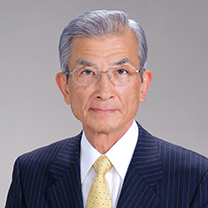The 14th Award Profile of the Recipient

Name and age
Kazuhiko Maekawa (male)Born March 7, 1941 (81 years old)

Name and age
Kazuhiko Maekawa (male)Born March 7, 1941 (81 years old)
● Current Affiliation
Professor Emeritus, Tokyo University
Director, Kamimizo Healthcare Facility for the Elderly, Izumi, Medical Cooperation Meiwa-kai
● Major Accomplishments
1998 Chairman of the Radiation Exposure Medicine Network Conference, National Institute of Radiological Sciences
2000 Chairman of the Emergency Medical Care Working Group, Nuclear Safety Commission of Japan, Nuclear Power Plant Disaster Prevention Committee
2011 Cabinet Office, Nuclear Emergency Expert Group (Special Investigator)
2011 Cabinet Secretariat, Member of Working Group on Risk Management of Low Dose Exposure
2012 Ministry of the Environment Expert Advisory Panel on Health Communication with Nuclear Victims, Ministry of the Environment
2014 Ministry of Health, Labour and Welfare. Investigation of long-term health management of workers at TEPCO’s Fukushima Daiichi Nuclear Power Plant
● Reasons for Selection
Professor Maekawa served as the chairman of the Radiation Exposure Medicine Network Conference of the National Institute of Radiological Sciences, which was established in 1998, and led the team that treated patients exposed to radiation from the Tokaimura JCO accident that occurred in 1999, clarifying the pathophysiology of high-dose radiation exposure.
After the Fukushima Daiichi Nuclear Power Plant accident following the Great East Japan Earthquake, Professor Maekawa served as a special investigator for the Cabinet Office, providing advice on long-term medical treatment and management for victims exposed to radiation, and the effects of radioactive materials on the human body.
Professor Maekawa then served as President of the Radiation Accident Medical Research Association and Director of the Radiation Injury and Disaster Medical Research Institute of the Nuclear Safety Research Association, and continues to share his experience and knowledge on radiation exposure medicine and radiation accidents and disasters both domestically and internationally.
Professor Maekawa has made significant contributions to the field of radiation exposure medicine, including the establishment of a medical system for radiation exposure medicine in accordance with the revised “Guidelines for Emergency Exposure Medicine” and the “Guidelines for Disaster Prevention Measures for Nuclear Facilities”, as well as the basic plan for disaster prevention, and has played a central role since the early days in establishing the foundation of the current radiation exposure medicine system in Japan. Professor Maekawa has thereby contributed to the improvement of radiation exposure medicine and the improvement and development of Hibakusha medical care.
Professor Maekawa was selected as the recipient of the award in recognition of these achievements.
